
What to do if you hear radio communications on your telephone
|
|
|
|
What to do if you hear radio communications on your telephone |
|
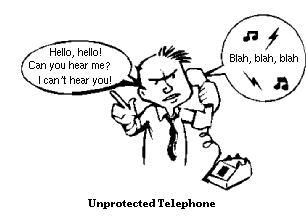 Interference
occurs when your telephone instrument fails to "block out" a nearby radio
communication. Potential interference problems begin when the telephone is built
at the factory. All telephones contain electronic components that are sensitive
to radio. If the manufacturer does not build in interference protection, these
components may react to nearby radio communications. Telephones with more
features contain more electronic components and need greater interference
protection. If you own an unprotected telephone, as the radio environment around
you changes, you may sometimes hear unwanted radio communications. Presently,
only a few telephones sold in the UK have built-in interference protection.
Thus, hearing radio through your telephone is a sign that your phone lacks
adequate interference protection. This is a technical problem, not a law
enforcement problem. It is not a sign that the radio communication is not
authorized, or that the radio transmitter is illegal.
Interference
occurs when your telephone instrument fails to "block out" a nearby radio
communication. Potential interference problems begin when the telephone is built
at the factory. All telephones contain electronic components that are sensitive
to radio. If the manufacturer does not build in interference protection, these
components may react to nearby radio communications. Telephones with more
features contain more electronic components and need greater interference
protection. If you own an unprotected telephone, as the radio environment around
you changes, you may sometimes hear unwanted radio communications. Presently,
only a few telephones sold in the UK have built-in interference protection.
Thus, hearing radio through your telephone is a sign that your phone lacks
adequate interference protection. This is a technical problem, not a law
enforcement problem. It is not a sign that the radio communication is not
authorized, or that the radio transmitter is illegal.
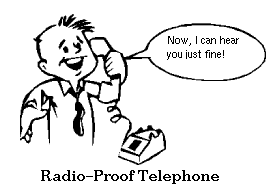 Because interference problems
begin at the factory, you should send your complaint to the manufacturer who
built your telephone. A sample complaint letter is provided
here.
Because interference problems
begin at the factory, you should send your complaint to the manufacturer who
built your telephone. A sample complaint letter is provided
here.
You can also stop interference by using a specially designed "radio-proof" telephone, available by mail order. A recent FCC study found that these telephones, which have built-in interference protection, are a very effective remedy.
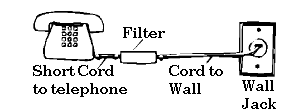 Interference problems in
telephones can sometimes be stopped or greatly reduced with a radio filter.
Install this filter at the back of the telephone, on the line cord, and/or at
the telephone wall jack. Radio filters are available at local phone product
stores and by mail order. (See attached list, Radio Interference Filters.)
Interference problems in
telephones can sometimes be stopped or greatly reduced with a radio filter.
Install this filter at the back of the telephone, on the line cord, and/or at
the telephone wall jack. Radio filters are available at local phone product
stores and by mail order. (See attached list, Radio Interference Filters.)
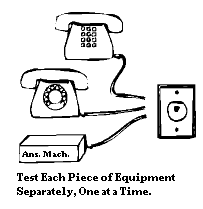 To get started, follow these
steps: If you have several telephones, or accessories such as answering
machines, un-plug all of them. Then plug each unit back in, one at a time, at
one of your wall jacks. Listen for the radio communication. If you hear
interference through only one telephone (or only when the answering machine is
plugged in), then the problem is in that unit. Contact the manufacturer of that
unit for help. Alternatively, simply stop using that unit, replace it with a
radio-proof model, or install a radio filter. (NOTE: Only a very small
percentage of interference problems occur in the outside telephone lines. Your
local telephone company can check for this type of problem.)
To get started, follow these
steps: If you have several telephones, or accessories such as answering
machines, un-plug all of them. Then plug each unit back in, one at a time, at
one of your wall jacks. Listen for the radio communication. If you hear
interference through only one telephone (or only when the answering machine is
plugged in), then the problem is in that unit. Contact the manufacturer of that
unit for help. Alternatively, simply stop using that unit, replace it with a
radio-proof model, or install a radio filter. (NOTE: Only a very small
percentage of interference problems occur in the outside telephone lines. Your
local telephone company can check for this type of problem.)
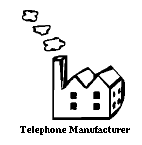 Next, it's important to follow
through and contact the manufacturer. Telephone manufacturers need to know if
consumers are unhappy about a product's failure to block out radio
communications. Also, the manufacturer knows the design of the telephone and may
recommend remedies for that particular phone.
Next, it's important to follow
through and contact the manufacturer. Telephone manufacturers need to know if
consumers are unhappy about a product's failure to block out radio
communications. Also, the manufacturer knows the design of the telephone and may
recommend remedies for that particular phone.
To file a complaint, write a letter to the manufacturer, using the sample_letter at the end of this document. To help the manufacturer select the right remedy, be sure to provide all the information in the sample, including the type of radio communication that the telephone equipment is receiving. You can identify the type of radio communication by listening to it. There are three common types:
(1) AM/FM broadcast radio stations - Music or continuous talk distinguishes this type of radio communication. The station identifies itself by its call letters at or near the top of each hour.
(2) Citizen's Band (CB) radio operators - These radio operators use nicknames or "handles" to identify themselves on the radio. Usually, the CB operator's voice is clearly heard. You may also hear sound effects or other noises.
(3) Amateur ("ham") radio operators - Amateur radio operators are licensed by the FCC. They use call letters to identify their communications. The amateur's voice can be heard but may be garbled or distorted.
Cordless telephones are low-power radio transmitters/receivers. They are highly sensitive to electrical noise, radio interference, and the communications of other nearby cordless phones. Contact the manufacturer for help in stopping interference to your cordless telephone.
Final note: Current FCC regulations do not address how well a telephone blocks out radio communications. At present, FCC service consists of the self-help information contained in this bulletin. A partial list of radio-proof telephones and radio filters is also attached.
The FCC strongly encourages manufacturers to include interference protection in their telephones as a benefit to consumers. The telephone manufacturing industry has begun to develop voluntary standards for interference protection. The FCC will continue regular meetings with manufacturers and will closely track the effectiveness of their voluntary efforts.
Name and address of telephone manufacturer Dear Manufacturer: I am writing to register a complaint about telephone equipment I purchased (manufactured by your company). Unfortunately, your product is receiving a nearby radio communication, making it difficult for me to complete telephone calls. Please contact me within 30 days to discuss what steps your company will take to make my telephone work properly. Thank you for your help. I look forward to your prompt reply. Name:___________________________ Telephone:_________________________ Address:______________________________________________________________ City/State/Zipcode:___________________________________________________ Type of telephone equipment:__________________________________________ Model Number:_________________________________________________________ Description of Interference (AM/FM, CB, Amateur, etc):
Collin's Home Page Colin's Amateur Radio Page Colin's Snooker Page Colin's Guest Book Contact Me About Me
This Web page was last updated on Friday September 21, 2001
© 2001 Designed by Colin McCord